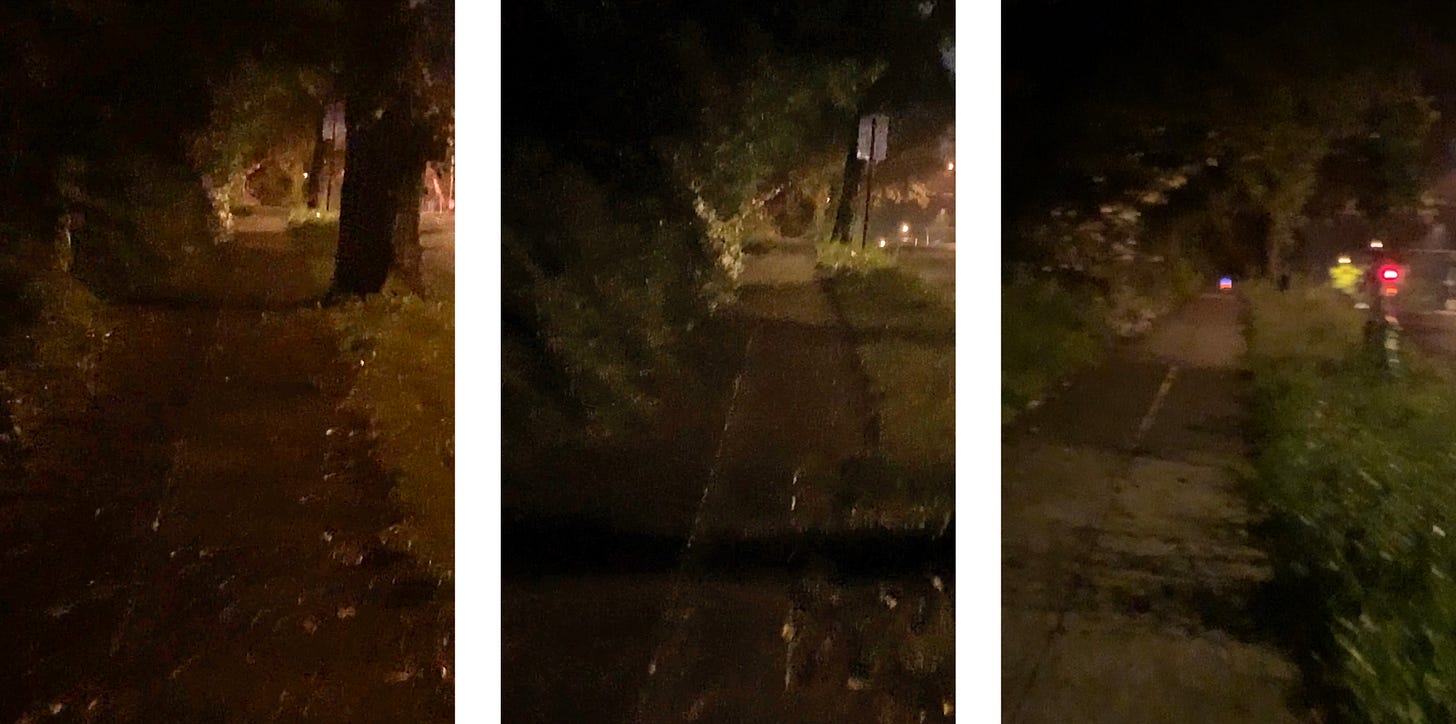
Hello Light Readers! I went out running last night and it was just a little bit cool for the first time since April maybe? I run the same route most nights, one that takes me by a densely wooded area. A few weeks back, I saw a fox run no more than ten feet in front of me. It was absolutely thrilling and the moment was over before I’d really registered what I’d seen. The next night, I saw the fox in the same place again! Determined to document this, I started a video on my phone when I neared the spot the next night, but no fox, and no fox for the night after that and the one after that. My phone now has a dozen or so of these ninety-second videos of the darkened sidewalk, crickets chirping along with the low buzz of cicadas, a wild tangle of forest growing over the sidewalk and the phone camera focusing in and out as it struggles to lock on something.
One day, I’ll get that grainy, soft-focus video of the fox dashing across the street and effortlessly bounding up into the woods. But, for now, the videos of the empty sidewalk and silent streets accumulate. Each one is a mirror of the one before, recording my careful steps as I slowly walk forward, holding my breath.
As always, I’m Stephen Voss, a photographer in Washington, DC. If you enjoy this newsletter, I’d appreciate you letting someone you like know about it.
And, if you’re interested, here’s one of those videos, sans fox.
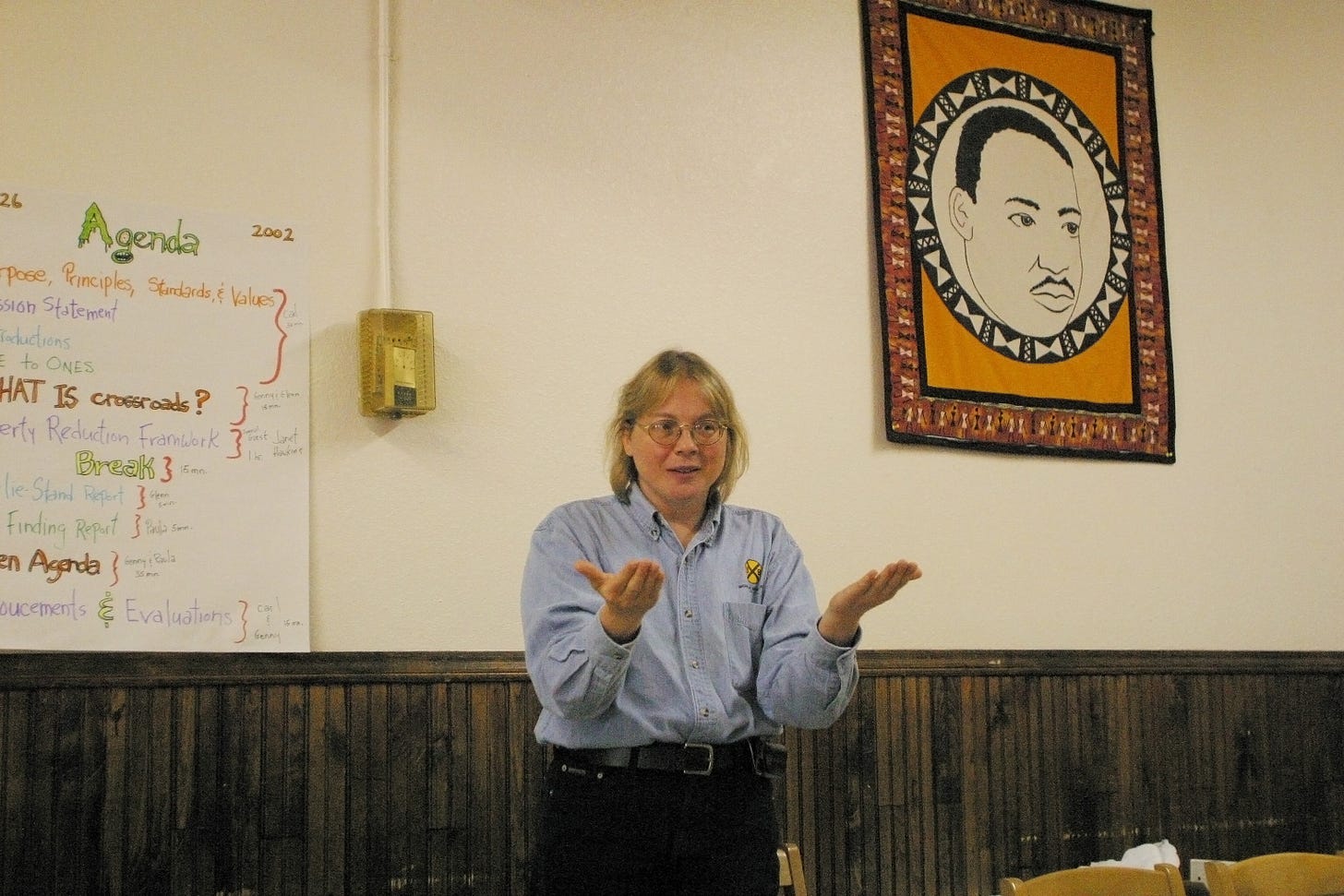
Genny Nelson, co-founder of Sisters of the Road Cafe in Portland, Oregon, passed away on August 21, 2020.
I met Genny soon after I began volunteering as a photographer for Street Roots, one of the first street newspapers in the country and one written and sold by those experiencing homelessness. I was new to Portland, new to photography, and new to phrases like “experiencing homelessness”. Early on, she taught me that in referring to a person without a home as a homeless person, we subsume their whole identity, dehumanize them and make it easier to avoid doing the emotional work of allowing yourself to be open and empathetic.
Sisters of the Road Cafe had a simple premise: a good meal for $1.50 (a price that hadn’t changed since their opening in 1979). If you didn’t have enough money, you could barter for the meal by doing fifteen minutes of work at the cafe. Genny had worked at non-profits before and seen how giving people things for free could result in an imbalance of power and a loss of dignity for those needing help. Her ongoing conversations with people living on the street taught her that people didn’t want to need charity, they want to be given an opportunity. By paying for their meal, or allowing work to be done in exchange, the cafe remained on equal footing with those who came in the door.
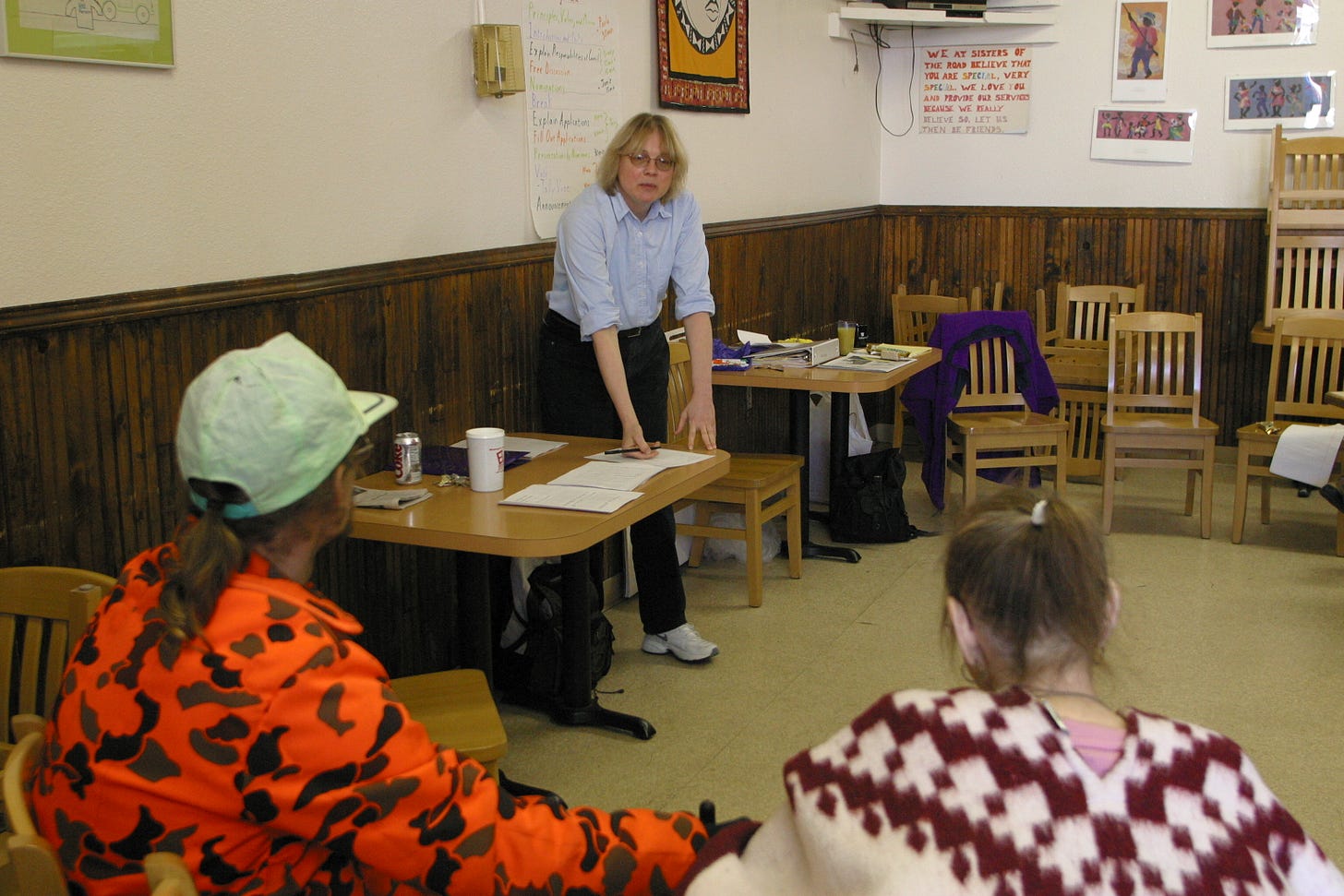
Walking into Sisters meant you were safe. For those who slept outside each night, safety was not something taken for granted. Inside, you were welcomed as you were and accepted as part of a community. This community extended to the staff - those who cooked the meals, who greeted guests and washed the dishes all had their introduction to the cafe as customers.
Genny would often say, “How we do what we did is more important than what we do.”
In 2001, Sisters embarked on an ambitious new project they called Crossroads. This project sought to interview people experiencing homelessness in order to collect real data that could be used by universities, policy makers and journalists to better understand root causes of homelessness. Its second component was to train people who were currently experiencing homelessness in social justice and community advocacy. She believed strongly that until men and women who had experienced homelessness had a say in public policy, it would remain an unsolved issue.
I was at the very beginning of my photographic career and, looking back, it’s hard to see what exactly was visual about the story of Crossroads, but I felt deeply that I wanted to be there.
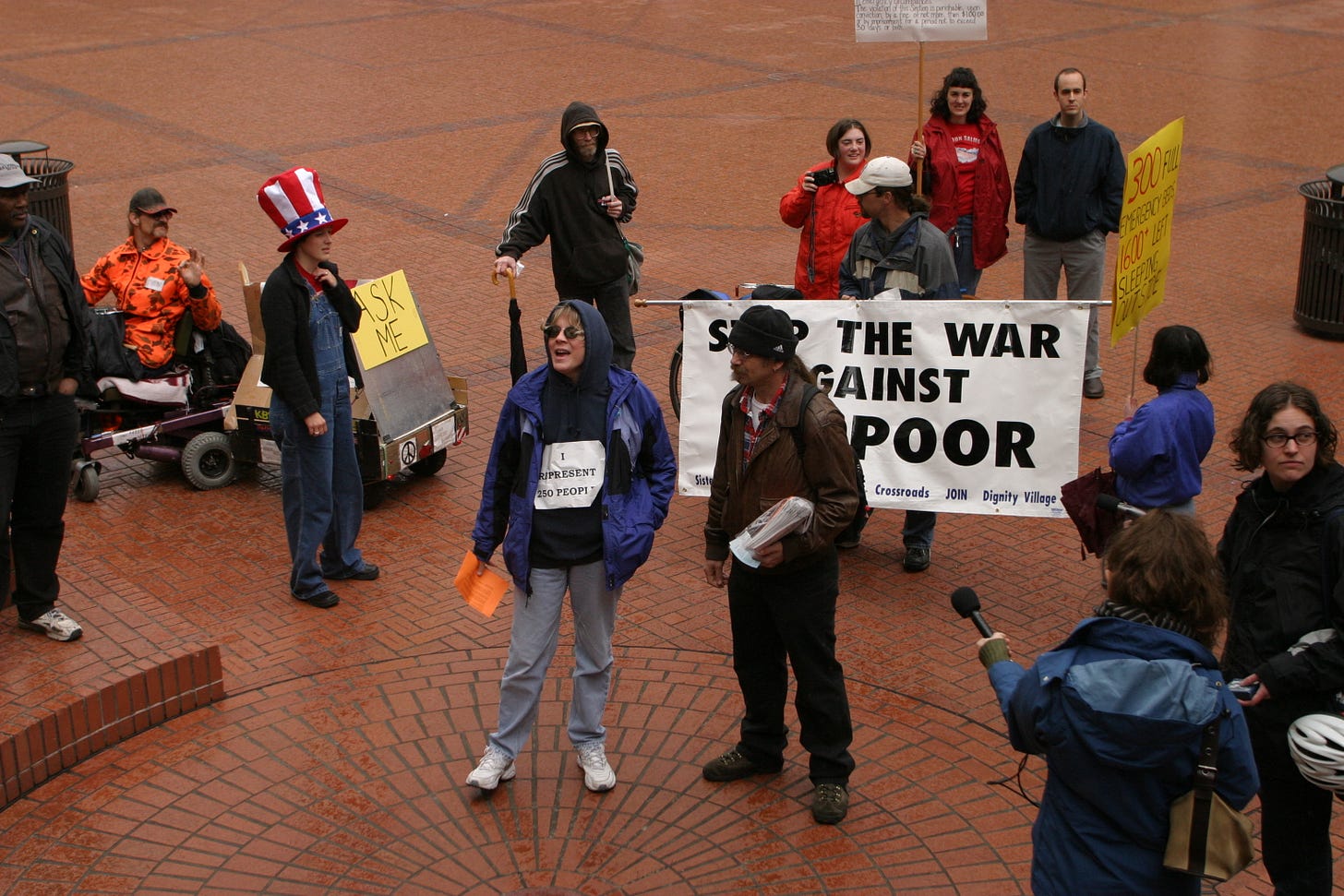
I began calling her and leaving voicemails once a week expressing an interest in documenting the beginnings of this organization. It took a couple of months of phone calls before she called me back. She remarked on my persistence and asked if we could grab coffee. When we sat down, she asked me what I wanted to do here exactly. I sensed her hesitancy at letting someone with a camera into the early days of this organization. Eventually, I think having worked with Street Roots worked in my favor and she invited me to join the first meeting where she’d ask those attending if they were comfortable with my presence.
To build an organization by building consensus is hard work. It can be raw and frustrating with meetings where little progress is made because a lot is at stake. Genny brought patience to each gathering and used her organizing experience in quiet, profoundly empathetic ways. She honored everyone’s voice and she made it clear that everyone there would be heard and their opinions respected. She was working to help the marginalized people who sat in the chairs around her to find their own voice and to learn how to advocate for themselves, so that one day she might step aside to let them lead this movement.
There was some pushback when Genny first introduced me and rightly so. A handful of the attendees didn’t want to be photographed at all. But, I came back each week and photographed those who had said yes, documenting the meetings, the press conferences and their testimony before the City Council. I brought prints to them and made extras for them to send to their family. I wanted to do right by them, but even moreso, I wanted to do right by Genny.

During those long Saturday meetings, on damp, gray days in Portland, I saw Genny’s integrity firsthand in the way she fiercely defended the dignity of those who joined her. The few times I saw her angry, it was when she stood up to someone who had diminished another with a mean-spirited comment or a sharp rebuke of their expressed opinion. But, even then, her words came from a sense of love and a desire to both acknowledge and forgive the wrongs committed so that everyone might be brought again into the fold.
The meetings would always start with a check-in, each person sharing a bit of their lives, how they were feeling or whatever was on their mind. Genny was vulnerable, confiding in the group about her decades of struggle with diabetes. I remember one check-in as her cheeks burned red when she shyly but joyfully described a great date she had gone on earlier that week.
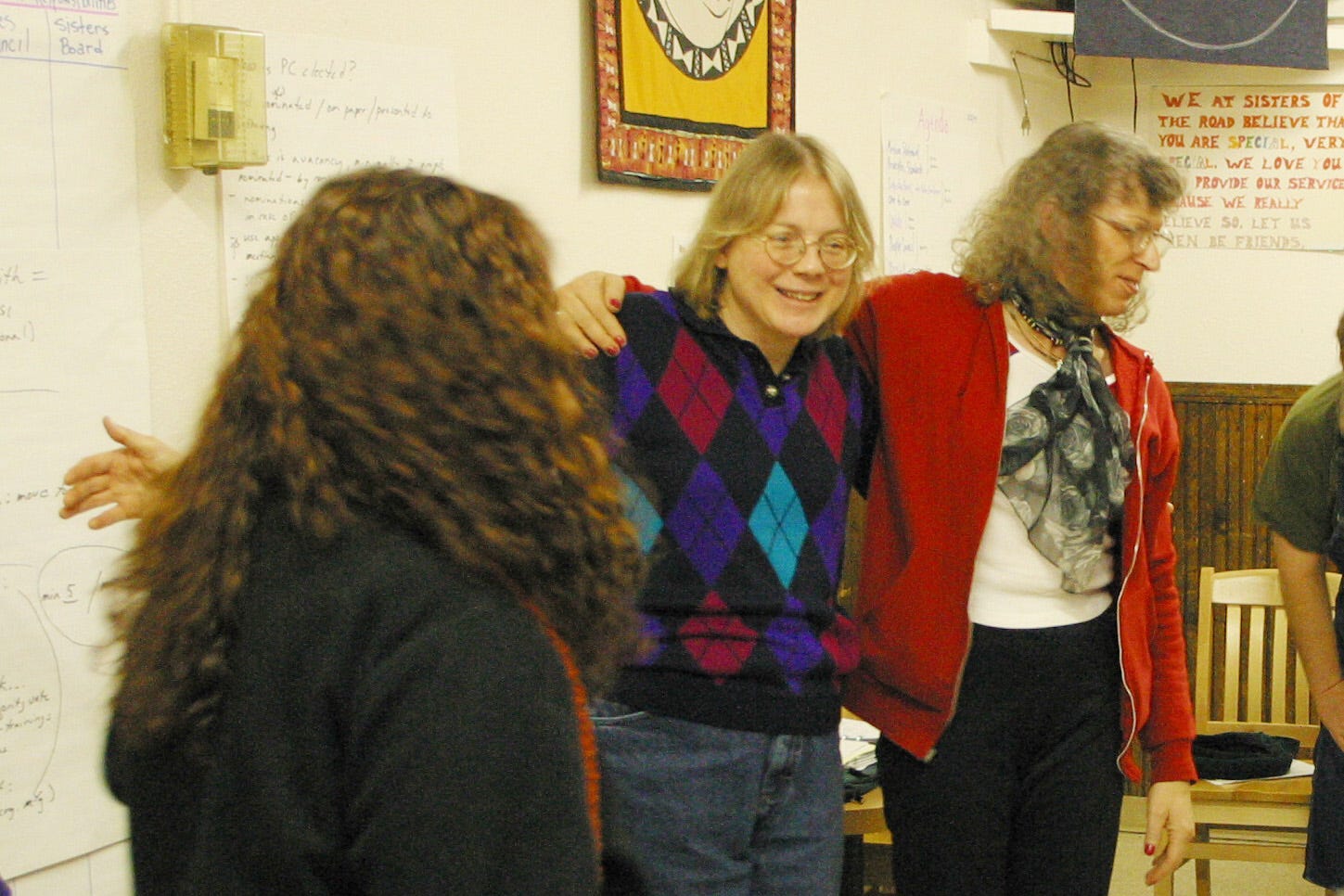
I last saw Genny in 2005, just before I moved from Portland to Washington, DC. I handed her a thick envelope filled with B&W negatives and contact sheets - nearly the entirety of my work done for Crossroads over a couple of years (save for a few digital images from my first DSLR).
When I think about Genny, I imagine the concentric circles radiating outward of people whose lives were positively affected by her. Even today, as COVID-19 and staffing/funding shortages have caused the cafe to reduce its hours and switch to takeout-only, her life’s work is seen in each meal served, each connection made with a stranger and each small act of kindness. The mission of Sisters carries on, an embodiment of Genny’s love and devotion to the dignity of all people.
Currently
Reading Caste by Isabel Wilkerson - Wilkerson draws a through line between the treatment of African Americans in this country and the Indian caste system. I’m only halfway through, but so much has stuck with me, like this passage:
A few years ago, a Nigerian-born playwright came to a talk that I gave at the British Library in London. […] She talked with me afterward and said something that I have never forgotten, that startled me in its simplicity.
“You know that there are no black people in Africa,” she said. Most Americans, weaned on the myth of drawable lines between human beings, have to sit with that statement. It sounds nonsensical to our ears. Of course there are black people in Africa. There is a whole continent of black people in Africa. How could anyone not see that?
“Africans are not black,” she said. “They are Igbo and Yoruba, Ewe, Akan, Ndebele. They are not black. They are just themselves. They are humans on the land. That is how they see themselves, and that is who they are.”
What we take as gospel in American culture is alien to them, she said.
“They don’t become black until they go to America or come to the U.K.,” she said. “It is then that they become black.”
Listening to comedian Mike Birbiglia’s podcast called Working It Out - In particular, the first episode where Ira Glass gives him notes on his comedy routine is a masterclass in the nuts and bolts of storytelling. Glass is so clearheaded about what’s effective and what’s not in how we connect with one another through the stories we tell. He’s worked with Birbiglia for years and he’s able to offer pinpoint guidance that’s demonstrative of his understanding of what makes Birbiglia’s stories funny and compelling in the first place.
Absorbing new ideas about emotional intelligence - Craig Mod’s thoughts about emotional intelligence is one of the more pointedly moving things I’ve read recently. This is the second newsletter in a row where I’ve linked to Craig’s work, but I think he’s an archetype of the sort of person I admire most - the independent, multi-platform artist who has carved out a life and living doing meaningful, thoughtful work. I hope you’ll give it a read.
Thanks for reading through. As you’ve seen above, I’m very grateful for all that I learned from Genny and thankful for the opportunity for you to know a little about her, too. If you’re interested in supporting Sisters and their vital work in Portland, you can make a contribute here.
Until next time, take good care of one another and thanks for your time.




Thank you for providing a daily dose of inspiration! ...I know you're going to see that sly old fox!.